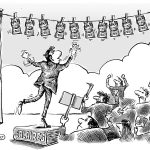The Central Bank is trapped
In the wake of the Covid-19 crisis, calls for the cancellation of public debts are gaining momentum.
It did not take long for Christine Lagarde to firmly reject calls for the cancellation of all or part of the public debt that the European Central Bank now holds in its vault. The European treaties oppose it rightly argues Ms Lagarde, but what can they do against economic logic, she is told. Is this debate really about economics or more about politics?
It is a fact, even faster and more strongly than in the aftermath of the 2008 financial crisis, the world’s central banks “flooded us with cash” 1, this time to the well-founded rescue of States’s support plan facing the emergency. As they continue to venture a little further down the path of almost direct financing of the economy, they should not be surprised to see these calls for the cancellation of the debts they hold on states rise. After all, didn’t they themselves break the independence pact? And would they not do better, by recognizing it, to agree openly financing and for the good of all, the stimulus and investment programs that governments undertake to carry out on a massive scale, perhaps even under their benevolent control?
While central banks have made themselves more dependent on states, however, the latter are not freed from their own constraints.
The thesis is attractive, to say the least. Temporarily relieving states of the burden of the imponderable – the pandemic crisis – to allow them to devote themselves to rebuilding the economy towards education, health and the climate transition, are reasons that are indeed admissible. The thesis receives even a renewed support, at the other end of the spectrum of thought, from those who consider that reserve currencies would preserve our States from the pangs of monetary disqualification and the flight of savers, too happy to finance growth and the future of the planet, forever removed from any risk of inflation. Magic money2 would be the new normal in this new world, and the state could therefore use it for more just causes.
These noble intentions, however, come up against hard and stubborn realities. The debt accumulated today is sustainable and repayable at a cost as much lower as the Central Bank, which holds a significant part of it, guarantees its repayment. The trust that she places in it cannot be reduced to her signature alone. Cancelling that part of the debts is to take the risk – which has been proven on many painful occasions throughout our history – of cutting oneself off from all other sources of funding. Savings – even abundant ones – would quickly disappear and take refuge in the most sterile assets and those furthest from any form of productive investment (see the recent rise in bitcoins, gold and such). While central banks have made themselves more dependent on states, the latter are not for all that freed from their own constraints and are now indebted to them. They are also facing savers and investors.
Debt sustainability largely depends on the capacity of states to demonstrate the effectiveness of this spending.
The holding of public debt by such and such a creditor, which would be more or less accommodating, makes us miss the real debate, that of the advisability and efficiency of public spending. It is widely accepted today that the mission of the State – transposed in part to the level of the European Union – extends beyond the strict financing of its sovereign missions, in which the community of citizens must participate as fairly and as widely as possible. However, the conditions for the implementation of public spending depend above all on the quality of the institutions responsible for it, as well as the choices democratically accepted by the people and steered by their parliaments. Debt sustainability largely depends on the ability of governments to demonstrate the effectiveness of their spending. It does not imply the illusion of unlimited resources to inadequacy, if not corruption, but rather strict control of expenditure, especially operating, and the impetus and delegation to private actors of the implementation of the reforms requested. At a time when the incompressible constraints linked to the financing of the aging population, health and education are growing; it would be financially suicidal to deprive oneself of other supports and associated measures of control and efficiency, which are often the prerogative of private allocation of investments.
Neither the debt owed to the Central Bank nor households’ savings are “jackpots” that can be disposed of without compensation. Trust is hard earned easy to lose.
1 See our article of March 24, 2020 “Flooded with cash”
2 See our article of June 2, 2020 “Magic money”
Valérie Plagnol – Feb 2021 – Published in French in www.allnews.ch – Cartoon ©Barret



